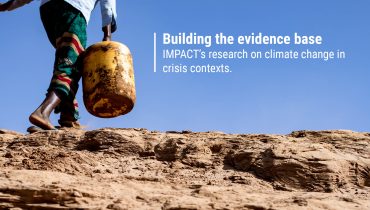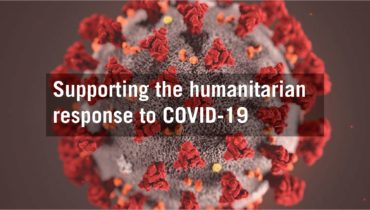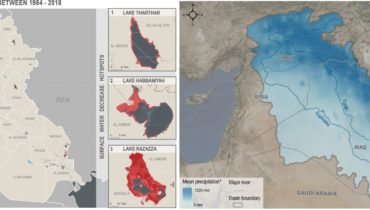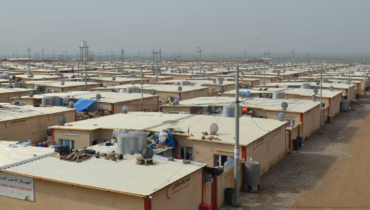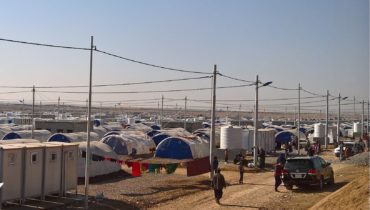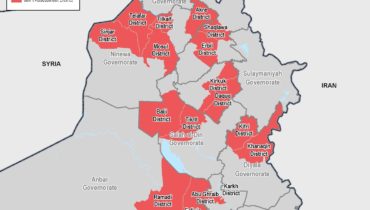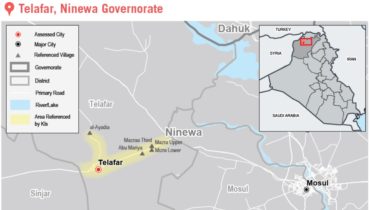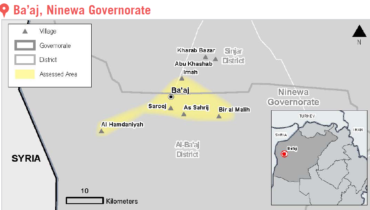Iraq: REACH rapid assessments on displacement, intentions and needs of IDPs fleeing conflict around Mosul
27 October 2016
 Since the capture of Mosul in 2014 by armed groups, an estimated one million civilians have remained in the city, with limited access to food, basic services and humanitarian assistance. In the past week, military operations to recapture the city have caused the displacement of over 10,500 people,[1] with the total number of affected people expected to rise considerably in the coming days. In preparation of the Mosul Offensive, REACH had conducted a humanitarian overview of the Mosul area to highlight multi-sectorial needs of the population inhabiting the city and intentions of displacement.
Since the capture of Mosul in 2014 by armed groups, an estimated one million civilians have remained in the city, with limited access to food, basic services and humanitarian assistance. In the past week, military operations to recapture the city have caused the displacement of over 10,500 people,[1] with the total number of affected people expected to rise considerably in the coming days. In preparation of the Mosul Offensive, REACH had conducted a humanitarian overview of the Mosul area to highlight multi-sectorial needs of the population inhabiting the city and intentions of displacement.
Since the beginning of the offensive, and in order to support the humanitarian response to the ongoing Mosul Offensive, REACH is conducting regular rapid assessments in areas witnessing displacement in coordination with the CCCM Cluster and humanitarian partners to provide an understanding of the displacement patterns, vulnerability, needs and intentions of recently displaced IDPs.
The first two site-level factsheets describe the situation of IDPs in Zelikan Camp (24 October) and Ibrahim Khalil Village and Debaga Camp (27 October), with the following key findings:
- Displacement towards Zelikan IDP Camp: Conflict near the villages of Chanchi and Derik, 20km north of Mosul led 32 families from Chanchi and Derik villages to flee to Zelikan IDP Camp between 17-21 October. Despite prior planning, the available window for displacement was small, permitting only a few families to leave while others remained trapped. Eight hours after leaving their villages of origin, IDPs arrived in Zelikan Camp, where they received food assistance, water and shelter. While this camp is not yet at capacity, IDPs reported insufficient water, a lack of cooking facilities, and limited access to winterization items and medication.
- Displacement towards Ibrahim Khalil Village and Debaga Camp: Changing conflict dynamics since 14 October have led to the displacement of over 900 people from the Nimrod area, south east of Mosul. A first wave of displacement travelled to Debaga Camp, while a second wave of approximately 600 individuals travelled to village of Ibrahim Khalil, close to the front line. IDPs in Debaga have received food rations and water, although access to shelter remains challenging given the large numbers already present. In Ibrahim Khalil village, significant overcrowding, the proximity to active conflict, and limited access to humanitarian assistance point to population of 1,500 individuals at particular risk.
REACH will continue to collect data on displacement sites and the situation within Mosul on a rolling basis, and the findings will be published on the REACH Resource Center for Iraq and shared broadly with operational partners in Iraq.
[1] OCHA, as of 25 Oct 2016


